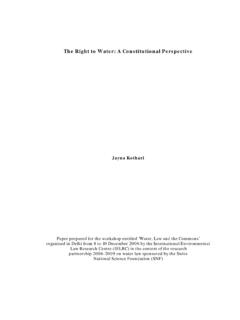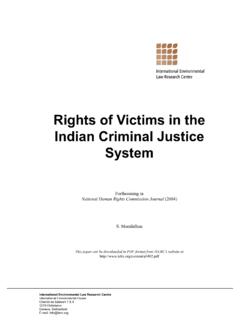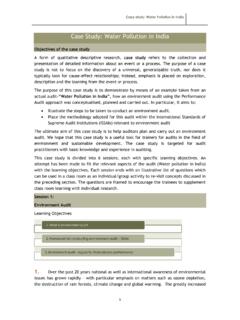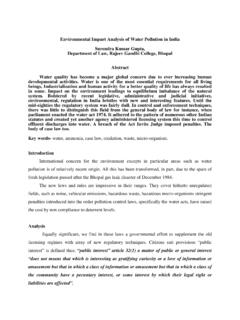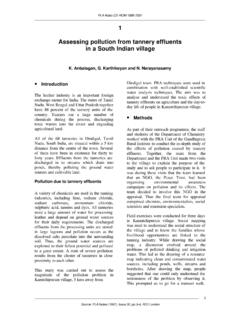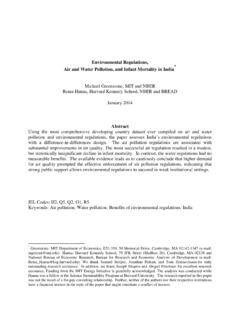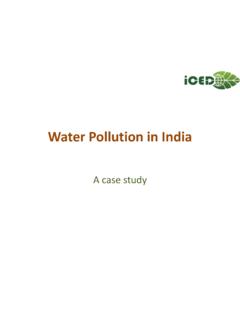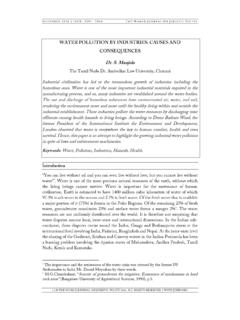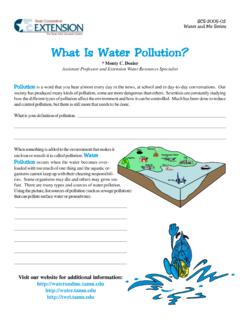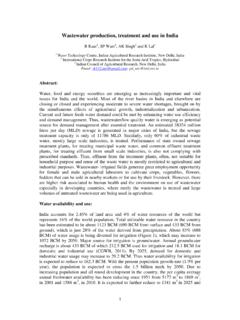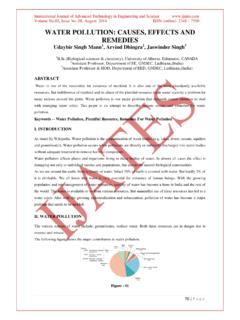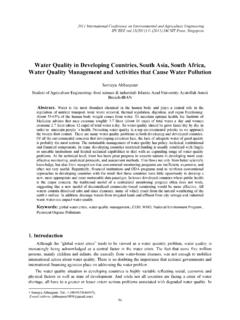Transcription of WATER LAW IN INDIA - IELRC.ORG - International ...
1 This paper can be downloaded in PDF format from IELRC s website Environmental Law Research CentreInternational Environment HouseChemin de Balexert 7, 1219 Ch telaineGeneva, EnvironmentalLaw Research CentreWATER LAW IN INDIAOVERVIEW OF EXISTING FRAMEWORKAND PROPOSED REFORMSP hilippe CulletIELRC WORKING PAPER2007 - 01 TABLE OF WATER LAW FRAMEWORK1A. International Framework1B. Legal Framework in WATER LAW REFORMS6A. WATER as a Natural Resource and Economic Good6B. Decentralisation and Participation7C. Redefinition of the Role of the Government10D. Conservation11 FINAL REMARKS12 INTRODUCTIONIn the words of the United Nations Development Programme (UNDP), WATER is the stuff of life and a basic humanright.
2 1 Thus, WATER is an essential element for life including human life on earth and as a result is a coreconcern in law. From a legal perspective, the UNDP rightly emphasises the importance of the human right dimensionof WATER . Yet, in practice, WATER law is made up of a number of elements comprising a human right dimension, aswell as economic, environmental or agricultural aspects. In particular, historically, one of the central concerns ofwater law has been the development of principles concerning access to and control over WATER is directly essential for human life. WATER is also indirectly essential, for instance, as an indispensableinput in agriculture.
3 Yet, despite the central role that WATER has always played in sustaining life, human lives andhuman economies, the development of formal WATER law has been relatively slow and often patchy. At the domesticlevel, colonial legislation first focused on the regulation of WATER for economic reasons, for instance, through thedevelopment of legislation concerning irrigation and navigation. Over the past few decades, increasing waterpollution and decreasing per capita availability have led to the development of other measures such as waterquality regulation and an emphasis on WATER delivery, particularly in cities, as well as environment-related , WATER law remains largely sectoral to-date.
4 At the International level, WATER regulation first focused mostly onnavigation in International watercourses. It has progressively evolved to encompass issues concerning the sharingof International waters. International WATER law has, however, not yet reached the stage where it provides anoverall regime for the regulation of WATER INDIA , WATER law is made of different components. It includes International treaties, federal and state acts. It alsoincludes a number of less formal arrangements, including WATER and WATER -related policies as well as customaryrules and regulations.
5 This working paper maps out the relevant legal framework concerning WATER in INDIA . Thefirst section delineates WATER law as it evolved until recently. The second section then examines proposed andongoing WATER law reforms that are in the process of completely redrawing INDIA s WATER legal WATER LAW FRAMEWORKE xisting WATER law is made up of a number of different instruments. This is the case at the International levelwhere only certain aspects of WATER law have been developed and where no International WATER law treaty is also the case within INDIA where it remains difficult to identify a coherent body of comprehensive lawconcerning WATER .
6 This is related to the fact that distinct concerns have been addressed in different is also due to the division of powers between the centre and the states and the fact that WATER regulation ismostly in the hands of the section first highlights some of the salient International instruments that are relevant in INDIA . It thenmoves on to examine existing WATER regulation in INDIA and the different principles that govern different types International FrameworkInternational WATER law includes a number of instruments. They may not all apply directly in INDIA but contributein various ways to the development of WATER law at the International as well as national many years, International WATER law included mostly treaties concerning navigation in International rivers,which constituted one of the early areas of collaboration among states.
7 This has been expanded to many non-navigational aspects over time but the focus on International watercourses remains an important part of WATER law,as exemplified in the Farakka Indeed, the only multilateral treaty in the field of WATER is a convention11 United Nations Development Programme, Human Development Report 2006 Beyond Scarcity: Power, Poverty andthe Global WATER Crisis 1 (New York: UNDP, 2006).2 Treaty on Sharing of the Ganges Waters at Farakka, New Delhi, 12 December 1996, 36 Int l Leg. Mat. 519 (1997).concerning non-navigational uses of International This treaty adopted in 1997 provides a frameworkfor cooperation among states on International watercourses concerning the use of their waters apart from The basic principle it proposes for using International watercourses WATER is equitable and The basis for watercourse use is therefore agreement among concerned states concerning their respectiveneeds.
8 While there was substantial debate concerning the place of environmental aspects and sustainability, theprinciple of sustainable utilisation has not been adopted as a principle that would override equitable and adoption of the convention was in itself a landmark development since it took UN member states many yearsto agree on this Nevertheless, the difficulties encountered in negotiating this convention are reflected in thefact that its scope is relatively limited. Thus, it only applies to International watercourses and is therefore not aconvention addressing freshwater in general.
9 Further, its operative principles are relatively outdated as it fails tobreak clearly with the traditional principle of equitable and reasonable use in favour of a sustainability basedapproach. While the convention does not break much new ground at the conceptual level, only 14 states haveratified it so far. Further, only 21 countries (including those that have ratified) have signed the convention. Indiahas not even signed yet. Freshwater remains an issue over which states are fearful of losing control. As a result,even relatively weak coordination measures appear threatening to the UN 1997 Convention, there exist a number of International treaties that are directly or indirectlyconcerned with WATER .
10 The UNECE Convention on impact assessment applies, for instance, in the case of damsand other WATER -related infrastructure The Desertification Convention clearly links WATER anddesertification. In fact, its objectives provision recognises that rehabilitation, conservation and sustainablemanagement of WATER are key to combating The Convention on wetlands of International importance(Ramsar Convention) is intrinsically concerned with It is particularly noteworthy because it goes beyondthe main WATER treaties insofar as it considers WATER , which is entirely under national sovereignty.
